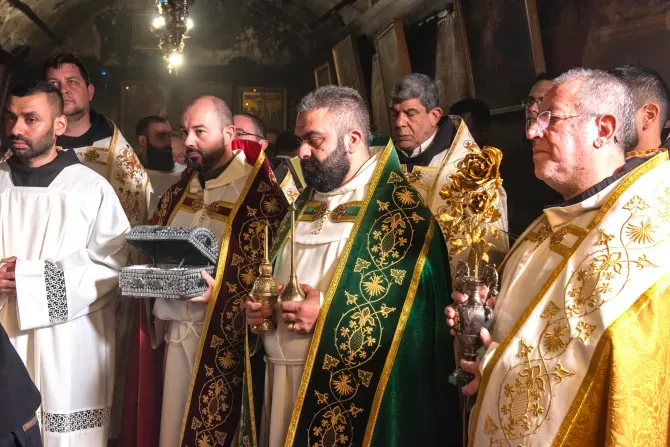Aboard the papal plane, 07 January, 2024 / 1:00 pm (ACI Africa).
The Magi arrived in Bethlehem this year bearing their gifts, as the faithful held out their hands for grains of incense and drops of myrrh in the annual reenactment of the Epiphany by the Franciscan friars of the Custody of the Holy Land.
 On the afternoon of Jan. 6, after the Second Vespers of the Epiphany and the adoration of the Baby Jesus in the Grotto of the Nativity in Bethlehem, three Franciscan friars of the Custody of the Holy Land portraying the Magi, distributed gifts (only incense and myrrh) to the gathered faithful in the church and the cloister of St. Catherine church in Bethlehem. Credit: Marinella Bandini
On the afternoon of Jan. 6, after the Second Vespers of the Epiphany and the adoration of the Baby Jesus in the Grotto of the Nativity in Bethlehem, three Franciscan friars of the Custody of the Holy Land portraying the Magi, distributed gifts (only incense and myrrh) to the gathered faithful in the church and the cloister of St. Catherine church in Bethlehem. Credit: Marinella Bandini
The afternoon celebration on Jan. 6 brought together a small crowd of believers, young and old, in the Latin Church of Saint Catherine, part of the complex of the Basilica of the Nativity.
The Magi made their appearance for the recitation of the Second Vespers of the Epiphany, marking the conclusion of the solemnity and also the end of the Christmas celebrations in Bethlehem.
After the prayer, the friars, the Magi, and the Custos of the Holy Land, Father Francesco Patton, who presided over the prayer, descended into the Grotto of the Nativity, bringing gold, incense, and myrrh to the sacred place of Jesus’ manifestation.




 The three gifts of the Magi — gold, incense, and myrrh — were placed on the altar of the Church of Santa Caterina in Bethlehem during the celebration of the Second Vespers of the Epiphany, on the afternoon of Jan. 6. Credit: Marinella Bandini
The three gifts of the Magi — gold, incense, and myrrh — were placed on the altar of the Church of Santa Caterina in Bethlehem during the celebration of the Second Vespers of the Epiphany, on the afternoon of Jan. 6. Credit: Marinella Bandini The Custos of the Holy Land, Father Francesco Patton walked through empty Bethlehem streets during the solemn entrance to the Basilica of the Nativity. Credit: Marinella Bandini
The Custos of the Holy Land, Father Francesco Patton walked through empty Bethlehem streets during the solemn entrance to the Basilica of the Nativity. Credit: Marinella Bandini



